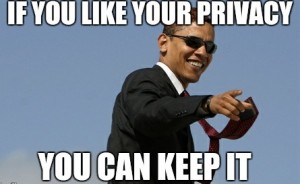President Barack Obama had too little to say about the needed reforms at the National Security Agency in Tuesday’s State of the Union address. His previous comments on the subject have captured the natural and necessary tension between one’s right to be left alone by the government and the government’s responsibility to catch criminals and prevent terrorist attacks.
At other times, however, Obama has telegraphed that he has no real interest in reform. In his recent speech devoted to the subject, the president suggested no one should be overly concerned because “the folks at NSA and other intelligence agencies are our neighbors. They’re our friends and family.”
This sounds good but is in fact a Pollyannaish view: Those who act on behalf of the government are our neighbors, friends, and family, but America is a nation of laws. If men and women were just and trustworthy there would be no need for the Fourth Amendment. In Soviet Russia the KGB depended on the “friends and family” plan to keep an eye on everyone.
Obama wants people to believe the NSA won’t abuse its power to spy on us because that would mean spying on themselves. As he put it, “They’ve got electronic bank and medical records like everybody else. They have kids on Facebook and Instagram. And they know, more than most of us, the vulnerabilities to privacy that exist in a world where transactions are recorded and email and text and messages are stored and even our movements can increasingly be tracked through the GPS on our phones.”
Seen through the prism of other things his administration has done, an alarming pattern develops. In the IRS scandal, government power was used to target the president’s political enemies. The Justice Department abused its power to target journalists and media organizations it deemed problematic by lying to judges to obtain invasive warrants. The White House called numerous journalists (some even on the Left) to warn and threaten them that they needed to stop asking tough questions.
This is an administration that has demonstrated a certain lawlessness and disregard for the rights of others. The NSA acted outside the law, violating the privacy of ordinary Americans simply because it could. NSA personnel looked up private information about former love interests and spouses.
To argue that we should not worry about the potential for abuse because NSA employees are our friends and neighbors or because they have privacy interests too, is at best silly; at worst, mendacious. The overseers of the Gulags and death camps understood better than most how hard labor combined with starvation and exposure lead to suffering and death. That in no way tempered their ferocity when in the position to bring harm to others.
Of course there is a meaningful difference between the KGB and the NSA, the safeguards accorded us in the U.S. Constitution among them, but it is not a check or a balance to rely on the good will of others and the hope that they will be honest, fair, and respectful of privacy as the Founding Fathers knew all too well.
The Constitution expects that flawed men and women will be promoted to positions of leadership. That’s why they created structural checks and balances, to limit the power of any one of them or a group of them. They added the Bill of Rights to limit the power of the federal government and to protect personal liberty.
Even if everyone at the NSA is a wonderfully good person, if we simply trust their goodwill it will be, as history has proven a stupid thing to do. And yet that is precisely what Obama is asking America to do.
When Obama told us we shouldn’t be worried because NSA employees are our neighbors, he was saying if we like our privacy, we can keep it. He said it to pacify us. He shows no intention to use the powers available to him to protect America from terrorists while scrupulously abiding by the constitutional limitations placed on him. Sadly Obama believes that rhetoric trumps real action — which might explain why his approval rating is so low. Talk is cheap, Mr. President, even if the NSA is listening in.
. . . . . . . . . . . . . . . . . . . . .
George Landrith is president of Frontiers of Freedom, a non-profit organization promoting a strong national defense. This article was published at Human Events.

